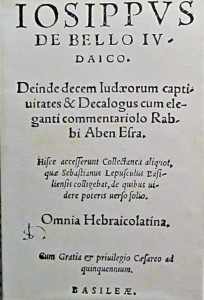 Josephus portrays the Jewish sects as three schools of philosophy, each with different tenets about the role of God in human affairs. He explains that they subscribe in different degrees to the doctrine of predestination.
Josephus portrays the Jewish sects as three schools of philosophy, each with different tenets about the role of God in human affairs. He explains that they subscribe in different degrees to the doctrine of predestination.
(171) At this time there were three schools of thought among the Jews, each of which had different opinions concerning human actions. One was called the Pharisees, another the Sadducees, and the other the Essenes. (172) Now for the Pharisees, they say that some actions, but not all, are the work of fate, 80 and some of them are in our own power and that they are liable to fate but are not caused by fate. But the sect of the Essenes affirms that fate governs all things, and that nothing befalls men except that which is according to its determination. (173) And as for the Sadducees, they exclude fate and say that there is no such thing, and that the events of human affairs are not at its disposal. But they suppose that all our actions are in our own power, so that we are ourselves the cause of what is good, and we suffer what is evil as a result of our own folly.
80. Josephus means providence, but he uses a term familiar to his Greek readers.
